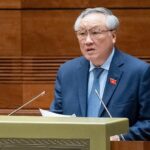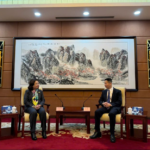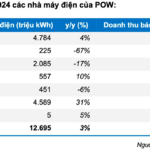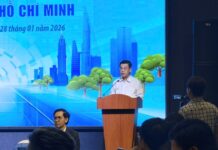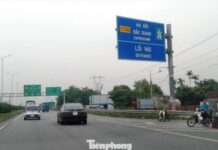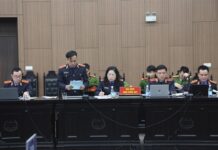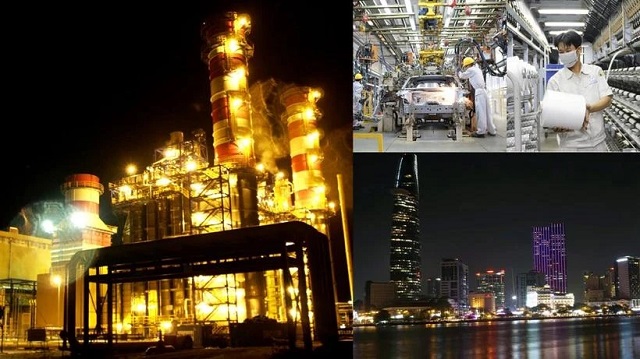
Vietnam’s power industry needs to thrive and act as a lever for the country’s economic development, with the strength to embrace the new era. (Photo: PV/Vietnam+)
|
The draft amended Law on Electricity was discussed at the 8th session of the 15th National Assembly. This time, the draft amended Law on Electricity mentioned the investment in construction and operation of nuclear power projects.
The return to researching stable power sources is highly appreciated by many experts, who believe that nuclear power will contribute to ensuring electricity for socio-economic development associated with the “dual goal” of green transition and energy security of the country.
Especially, at the closing session of the 13th Party Central Committee on November 25, General Secretary To Lam said that the Central Committee agreed with the policy of restarting the nuclear power program in Vietnam and continuing to study the Ninh Thuan nuclear power project.
This is an important task to develop the country’s energy infrastructure, meeting the development requirements of the country. This task needs to be carried out urgently, meeting the highest requirements for safety and environmental protection.
Ensuring energy security
In the Power Development Master Plan VII for the period of 2011-2020, with a vision to 2030, it is expected that from 2020 to 2030, Vietnam will put into operation 5 nuclear power plants with a total capacity of 10,700MW (producing about 70.5 billion kWh, accounting for 10.1% of electricity production).
In the context of green transition associated with energy security, traditional power sources such as hydropower have been basically exploited, while coal-fired power is being reduced strongly and no longer invested; domestic natural gas power sources are declining deeply, and LNG gas depends entirely on imports; power sources from renewable energies such as wind and solar power have high uncertainty and depend on the weather; offshore wind power is also in the early stages of testing… Therefore, considering restarting nuclear power and “legalizing” it is necessary.
According to Mr. Nguyen Quan, former Minister of Science and Technology, if there is no regulation on the development of nuclear power in the Law on Electricity, the implementation will face many difficulties later, because nuclear power cannot be done overnight. Specifically, from the preparation, training of experts, including technology experts and safety experts, to the infrastructure for nuclear power takes a very long time.
“When researching to build in Ninh Thuan before, we had to prepare for almost 15 years. But now, if we want to develop nuclear power, it may take 10 years to start, not immediately. So, there should be a regulation in the Law on Electricity,” said Mr. Nguyen Quan.
With this analysis, Mr. Nguyen Quan also proposed that the competent authority assign the Ministry of Natural Resources and Environment to immediately survey Vietnam’s nuclear fuel potential and assign the Ministry of Science and Technology to coordinate with ministries and branches to survey the potential for building nuclear power in Vietnam…
According to many experts, with the development of science and technology, many countries have returned to and expanded the development of nuclear power to meet the demand for clean energy, so the import and storage of fuel rods have become much easier and more economical than importing coal or gas.
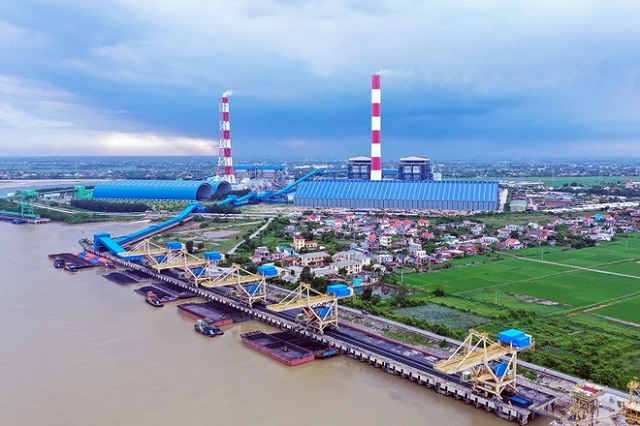
The Thai Binh 2 Thermal Power Plant project was revived and put into stable operation. (Photo: PV/Vietnam+)
|
Mr. Tran Anh Thai, former Director of the National Load Dispatch Center, compared: if operating a coal-fired power plant must store fuel for 2 weeks and need a large area for storage, but with nuclear power, it is possible to store fuel for 2 years in just a briefcase.
“That’s about the aspect of energy storage, and energy storage is one of the very important contents in ensuring a country’s energy security in a volatile environment. The second aspect is that with new technologies, nuclear power is becoming safer and cheaper…
According to energy expert Dao Nhat Dinh, although fuel must be imported, each import can allow nuclear power to operate for 3-4 years, even 5 years. Therefore, the degree of safety and stability of the market will be better than coal-fired and gas-fired power… and less carbon-intensive.
Long-term vision
Nuclear power is likened to a source of “green energy” for the future. However, to achieve this, nuclear power development must be absolutely safe.
According to Associate Professor, Dr. Nguyen Nhi Dien, former Director of the Da Lat Nuclear Research Institute, there must be 3 factors, namely technology, legal framework, and operators, and strict application of regulations and norms to ensure safety.
In the Power Planning VII, Vietnam has calculated and set the proportion of nuclear power to over 10% of electricity production. Many experts believe that Power Planning VIII will have a large dynamic/open ratio and will have to determine the capacity of nuclear power sources to be at least equivalent…
Mr. Nguyen Thai Son, Vice Chairman of the Vietnam Energy Association (former Chief of Staff of the National Steering Committee for Electricity Development) said that the approval of the Law on Electricity is very important for the development of the electricity industry, creating a legal corridor for power projects to develop faster as planned.
Moreover, the Law on Electricity will contribute to improving the efficiency in state management, promoting decentralization between the State, levels of the Government, ministries, branches, and localities, suitable for the characteristics of the electricity industry (although it is an infrastructure industry but with many elements that are constantly changing), to meet the needs of improvement in science and technology, contributing to ensuring national energy security.
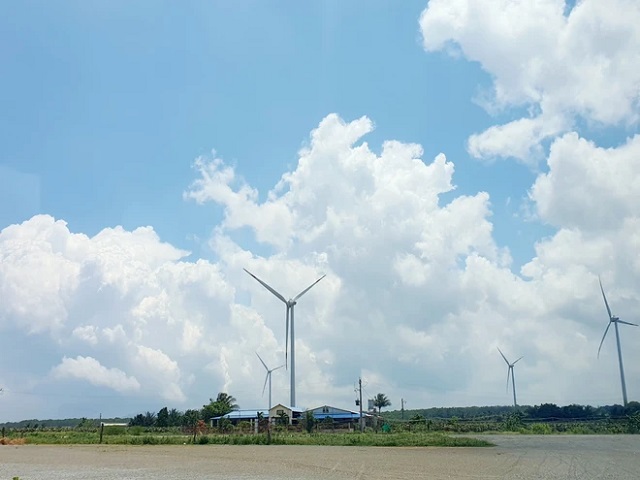
The combination of nuclear power and renewable energy is a prominent orientation to ensure energy security and sustainable development. (Photo: Duc Duy/Vietnam+)
|
Regarding the development of nuclear power, Mr. Son said that with the electricity demand increasing continuously at a rate of 2 digits (in the first 9 months of 2024, the electricity demand increased by 12.7%), Vietnam needs a large, stable source of electricity that can meet the rapid growth of load, meet the goal of reducing emissions, and diversify the power source structure…, so it is necessary to return to researching nuclear power.
The expert gave 3 advantages of nuclear power, which is the ability to provide stable and continuous electricity, not depending on the weather, while other renewable energy sources such as wind and solar power can be interrupted due to unstable weather.
On the other hand, the combination of nuclear power and renewable energy is a prominent orientation to ensure energy security and sustainable development. Especially, nuclear power is a clean energy source (cleaner than current fossil energy sources), while the use of coal and natural gas not only causes environmental pollution but also contributes to increasing CO2 emissions.
“Nuclear power does not directly emit CO2, helping to reduce climate change and air pollution, so nuclear power will contribute to achieving carbon neutrality by 2050 as committed by the Government at the COP26 conference on climate change,” said Mr. Nguyen Thai Son.
According to the expert, the development of nuclear power will promote the industry, science, and technology in Vietnam. Moreover, nuclear power projects will not only create high-quality jobs but also help Vietnam access advanced technology from developed countries to improve the technical and management level of the workforce.
To realize the plan of developing nuclear power in the future, the representative of the Vietnam Energy Association said that it is necessary to be well prepared in all aspects. From developing infrastructure, training human resources to building strict nuclear safety mechanisms to manage the waste system more effectively, and all must be implemented with a long-term, methodical, and careful strategy.
Especially, it is necessary to build a nuclear safety culture as a hard criterion for each operator of the plant as well as for the management staff.
“Nuclear safety culture will be a very important content and trained into a discipline, creating an educational culture parallel to the methodical training of people as well as awareness in the implementation process in the near future,” proposed Mr. Nguyen Thai Son./.
Duc Duy
The State-Owned “Big Player” Enters the EV Charging Station Game with Potential Profits of Nearly VND 2,000 Billion This Year
BVSC believes that POW will successfully commission and operate its NT3 and NT4 power plants as planned. However, the company is expected to record losses during the first three to four years of operation.

